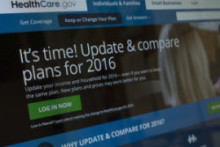Thirty of Georgia’s 159 counties will be left with just one insurer in the state insurance exchange when UnitedHealthcare exits the exchange next year, a new study says.
Another 47 Georgia counties will go from having three exchange insurers to two, according to the study, released Monday by the Kaiser Family Foundation.
The 77 counties are largely rural, and represent more than 67,000 enrollees currently, said the study, which tracked the impact of a potential UnitedHealthcare departure from all 34 states where it offers exchange plans.

State officials said earlier this month that UnitedHealthcare was leaving the Georgia insurance exchange in 2017. A unit of Minnesota-based UnitedHealth Group, UnitedHealthcare is also withdrawing from marketplaces in Arkansas and Michigan.
An independent United subsidiary, Harken Health, will continue to operate in the Georgia exchange, state officials say.
Company officials, citing financial losses, said Tuesday that UnitedHealthcare will operate only in a “handful” of health insurance exchanges in 2017.
UnitedHealthcare is one of nine companies offering plans in Georgia’s exchange this year.
Under the Affordable Care Act (ACA), all states have exchanges — most of which are federally run — that help consumers find and buy health coverage. More than 580,000 Georgians signed up for coverage in the insurance exchange for this year.
Because UnitedHealth often does not have one of the lower-cost plans, an exit by the company from all insurance exchanges would have only a modest effect nationally, the Kaiser Family Foundation study found.
Nationally, United has been less likely to offer one of the lowest-cost “silver plans,” the kind chosen by most enrollees. In states where it has offered a low-cost option, its pricing often has not been far from that of its competitors, the study said.

Still, the study found that UnitedHealthcare has offered one of the lowest-cost silver plans in about 1 in 5 Georgia counties, suggesting that it may have held a relatively large share of the market in these areas.
UnitedHealthcare’s pullout from the Georgia exchange “will be disruptive for consumers who are currently enrolled in a United plan and will need to switch during open enrollment,’’ said Cindy Zeldin of the consumer group Georgians for a Healthy Future.
“Consumers generally benefit from a competitive market, and without United in the mix, consumers will of course have one less insurance carrier from which to choose,’’ Zeldin said Tuesday. “Fewer options reduces competition, and United’s departure could place modest upward pressure on premiums.’’

But Zeldin said the ACA exchange in Georgia will still be competitive, even without UnitedHealthcare. She noted the company did not participate in the first year of the exchanges, and said the company has never been a strong player in the individual market, focusing more on the employer market in Georgia.
Meanwhile, Georgians may also lose other insurance exchange options if the pending mergers of Aetna and Humana, and Anthem and Cigna, are approved by regulators.
The foundation study said a United withdrawal would especially affect consumer choice and plan participation in Alabama, Kansas, Mississippi, North Carolina, Oklahoma and Tennessee.
All Kansas and Oklahoma exchange enrollees currently have two insurers from which to choose, and they would be left with only one if United were to exit and not be replaced.
In Alabama, 67 percent of exchange enrollees would go from having a choice of two insurers to a single exchange insurer. The remaining enrollees would go from having a choice of three insurers to two, the study found.
On the other hand, even after United’s withdrawal, every enrollee in Arkansas will continue to have three insurers from which to choose, a number that is sometimes seen as an important threshold for effective market competition to take place.
But the study found that in states such as Iowa, Alabama, Arizona, Nebraska, North Carolina and Tennessee, where United has offered considerably cheaper plans than some competitors, it is likely that more enrollees would have enrolled in a United plan and would therefore be most affected by the company’s withdrawal.
Ben Wakana, a spokesman for the federal Department of Health and Human Services, told Kaiser Health News that the government expects insurers to make adjustments in entering and exiting states.
“The marketplace should be judged by the choices it offers consumers, not the decisions of any one issuer,” he said. “That data shows that the future of the marketplace remains strong.”

